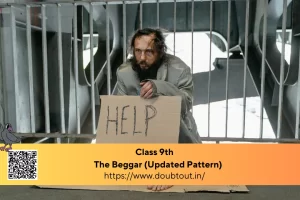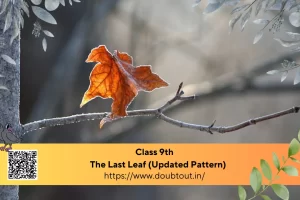
NCERT Solutions for Class 9 English Chapter 5 The Snake and the Mirror & Poem A Legend of the Northland

Thinking about the Text
I. Discuss in pairs and answer each question below in a short paragraph (30–40 words).
Question 1. “The sound was a familiar one.” What sound did the doctor hear? What did he think it was? How many times did he hear it? (Find the places in the text.) When and why did the sounds stop?
Answer: The doctor heard some noise from above when he opened the door. He thought that the sound was of rats. He heard it four times, including the sound he heard when he opened the door:
“Again I heard that sound from above.”
“Again came that noise from above.”
“Suddenly there came a dull thud as if a rubber tube had fallen to the ground…”
The sounds stopped when the snake appeared in front of the doctor.
Question 2. What two “important” and “earth-shaking” decisions did the doctor take while he was looking into the mirror?
Answer: The two important and earth-shaking decisions that the doctor took while he was looking into the mirror are the following:
i. He would shave daily and grow a thin moustache to look more handsome.
ii. He would always keep that attractive smile on his face.
Question 3. “I looked into the mirror and smiled,” says the doctor. A little later he says, “I forgot my danger and smiled feebly at myself.”
What is the doctor’s opinion about himself when: (i) he first smiles, and (ii) he smiles again? In what way do his thoughts change in between, and why?
Answer: (i) When the doctor smiled first, he was thinking that his smile was very attractive.
(ii) When he smiled again, he thought that he was a poor and stupid doctor.
His thoughts changed from being a handsome doctor to being a stupid doctor between the two situations. His thoughts changed because his life was now in danger.
II. This story about a frightening incident is narrated humorously. What makes it humorous? (Think of the contrasts it presents between dreams and reality. Some of them are listed below.)
Question 1. (i) The kind of person the doctor is (money, possessions)
(ii) The kind of person he wants to be (appearance, ambition)
Answer: (i) The doctor is a person whose earnings were meagre. His house was a small rented room. He only had 60 rupees, some shirts, dhotis and a black coat.
(ii) He believes in making himself look handsome. He decides that he would shave daily and grow a thin moustache.
Question 2. (i) The person he wants to marry
(ii) The person he marries
Answer: (i) He wants to marry a fat woman doctor who has plenty of money.
(ii) He marries a thin reedy person with the gift of a sprinter.
Question 3. (i) His thoughts when he looks into the mirror
(ii) His thoughts when the snake is coiled around his arm
Write short paragraphs on each of these to get your answer.
Answer: (i) When he looks into the mirror, he thinks that he has a very attractive smile. He decides to keep that smile on his face always and to shave daily. He seems contented when he looks into the mirror.
(ii) When the snake is coiled around his arm, he keeps sitting there holding his breath. He thinks that he is a poor and stupid doctor. He is terrified by the snake’s presence.
Thinking about Language
I. Here are some sentences from the text. Say which of them tells you that the author: (a) was afraid of the snake, (b) was proud of his appearance, (c) had a sense of humour, (d) was no longer afraid of the snake.
- I was turned to stone.
- I was no mere image cut in granite.
- The arm was beginning to be drained of strength.
- I tried in my imagination to write in bright letters outside my little heart the words, ‘O God’.
- I didn’t tremble. I didn’t cry out.
- I looked into the mirror and smiled. It was an attractive smile.
- I was suddenly a man of flesh and blood.
- I was after all a bachelor and a doctor too on top of it!
- The fellow had such a sense of cleanliness…! The rascal could have taken it and used it after washing it with soap and water.
- Was it trying to make an important decision about growing a moustache using eye shadow and mascara or wearing a vermilion spot on its forehead?
Answer: (a) Was afraid of the snake: Sentences 1, 3, 4, 5.
(b) Was proud of his appearance: Sentences 6, 8.
(c) Had a sense of humour: Sentences 9, 10.
(d) Was no longer afraid of the snake: Sentence 2, 7.
II. Expressions used to show fear
Can you find the expressions in the story that tell you that the author was frightened? Read the story and complete the following sentences.
- I was turned ____.
- I sat there holding ____.
- In the light of the lamp, I sat there like ____.
Answer:
- I was turned to stone.
- I sat there holding my breath.
- In the light of the lamp, I sat there like a stone image in the flesh.
III. In the sentences given below some words and expressions are italicised. They variously mean that one
- is very frightened.
- is too scared to move.
- is frightened by something that happens suddenly.
- makes another feel frightened.
Match the meanings with the words/expressions in italics, and write the appropriate meaning next to the sentence. The first one has been done for you.
- I knew a man was following me, I was scared out of my wits. (very frightened)
- I got a fright when I realised how close I was to the cliff edge.
- He nearly jumped out of his skin when he saw the bull coming towards him.
- You really gave me a fright when you crept up behind me like that.
- Wait until I tell his story — it will make your hair stand on end.
- Paralysed with fear, the boy faced his abductors.
- The boy hid behind the door, not moving a muscle.
Answer:
- I knew a man was following me, I was scared out of my wits. (very frightened)
- I got a fright when I realised how close I was to the cliff edge. (very frightened)
- He nearly jumped out of his skin when he saw the bull coming towards him. (to be suddenly surprised or frightened by something)
- You really gave me a fright when you crept up behind me like that. (too scared/ frightened)
- Wait until I tell his story — it will make your hair stand on end. (feel shocked or scared)
- Paralysed with fear, the boy faced his abductors. (too horrified to move)
- The boy hid behind the door, not moving a muscle. (too frightened to move)
IV. Reported questions
Report these questions using if/whether or why/when/where/how/which/what.
Remember the italicised verbs change into the past tense.
- Meena asked her friend, “Do you think your teacher will come today?”
- David asked his colleague, “Where will you go this summer?”
- He asked the little boy, “Why are you studying English?”
- She asked me, “When are we going to leave?”
- Pran asked me, “Have you finished reading the newspaper?”
- Seema asked her, “How long have you lived here?”
- Sheila asked the children, “Are you ready to do the work?”
Answer:
- Meena asked her friend if he/she thought his/her teacher would come that day.
- David asked his colleague where he would go that summer.
- He asked the little boy why he was studying English.
- She asked me when we were going to leave.
- Pran asked me if I had finished reading the newspaper.
- Seema asked her how long she had lived there.
- Sheila asked the children if they were ready to do the work.
Beginner’s Guide to Building Superhero Strength (without the gamma rays!)
( Poem A Legend of the Northland )
Thinking about the Poem
I. Question 1. Which country or countries do you think “the Northland” refers to?
Answer: The “Northland” may refer to any of the countries among Greenland, Norway, Russia, Canada, etc.
Question 2. What did Saint Peter ask the old lady for? What was the lady’s reaction?
Answer: Saint Peter asked the old lady for a piece of cake. She was very selfish and kept reducing the size of the cake as to her it seemed too big to give away.
Question 3. How did he punish her?
Answer: He cursed her and changed her into a woodpecker as a punishment for being so selfish.
Question 4. How does the woodpecker get her food?
Answer: The woodpecker needs to bore all day in the hard, dry wood to get itself some food.
Question 5. Do you think that the old lady would have been so ungenerous if she had known who Saint Peter was? What would she have done then?
Answer: I don’t think the old lady would have been so ungenerous if she had known who Saint Peter was. She would have given him as large a piece of cake so that she could please him to get rewarded.
Question 6. Is this a true story? Which part of this poem do you feel is the most important?
Answer: No, this is not a true story. It is a legend.
The part of the poem that, according to me, is the most important is:
And he said, “You are far too selfish
To dwell in a human form,
To have both food and shelter,
And fire to keep you warm.
This shows that we must do go things for humanity as we are capable of doing so in our human form. We should have gratitude for having food, shelter and fire. We should be generous to people.
Question 7. What is a legend? Why is this poem called a legend?
Answer: A legend is a folklore that is believed to be true by tellers and listeners but it has not been proven to have happened. It usually imparts some morals or a message.
This poem is called a legend because it also imparts the message of generosity.
Question 8. Write the story of ‘A Legend of the Northland’ in about ten sentences.
Answer: A Legend of the Northland
Once, Saint Peter was feeling very hungry and he asked for alms from an old lady. He asked if she could give him a piece of cake to eat. The lady was very selfish. She kept reducing the size of the cake as she felt that the size of the cake was too big to be given away as alms. At last, she did not give him any cake.
Saint Peter grew angry and cursed her to become a woodpecker. He said that from now on, she would have to bore dry, hardwood in order to get food. All her clothes got burnt in the chimney and till this day, woodpeckers bore all day long for food and water.
II. Question 1. Let’s look at the words at the end of the second and fourth lines, viz., ‘snows’ and ‘clothes’, ‘true’ and ‘you’, ‘below’ and ‘know.’ We find that ‘snows’ rhymes with ‘clothes’, ‘true’ rhymes with ‘you’ and ‘below’ rhymes with ‘know’.
Find more such rhyming words.
Answer: Here are more such rhyming words from the poem:
earth-hearth, done-one, lay-away, flat-that, myself-shelf, faint-saint, form-warm, food-wood, word-bird and same-flame.



